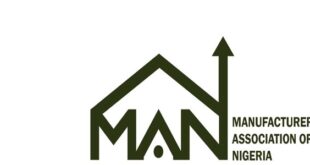By Rukayat Moisemhe
The Nigeria Customs Service (NCS) has called on manufacturers to be compliant with rules of origin while profiling to help ease clearing of inputs for goods and services.
The NCS made the call at the 12th Edition of Manufacturers Association of Nigeria (MAN), Apapa Branch Business Luncheon, on Tuesday in Lagos.
The News Agency of Nigeria (NAN) reports that the theme of the event was; “Facilitating Ease of Clearing Inputs for Manufactured Goods under AfCFTA”.
Compt. Auwal Mohammed, Customs Area Controller, Apapa Command, said the Nigeria Customs Service (NCS) had put strategies in place to ease Nigeria’s participation in the African Continental Free Trade Area (AfCFTA).
Mohammed said that compliance with the rules of origin was one criteria that would give manufacturers’ products and services the benefit of preferential treatment under the AfCFTA.
“The purpose of these rules is to ensure that goods entering a particular country from another member state within the AfCFTA have actually been made or produced with sufficient local content to qualify for preferential tariff treatment.
“Without such rules, it would be difficult for states parties to protect their local production and competitive domestic industries against competition from non-AfCFTA countries,” he said.
He urged manufacturers to be compliant while profiling their goods and services, saying that “they can be accorded status of Authorised Economic Operators (AEO)”.
Mohammed said the AEO staus would grant the manufacturers fast track privilege to exit their cargoes from the port to their warehouses without delay of examination and other formalities.
ACG Adeyanju Aremu, KLT Command, said the system being operated by the NCS gave the manufacturers the opportunity to do business virtually, thereby easing some of the bottlenecks.
Aremu, however said there were some challenges, including documentation and lack of skilled personnel, which he said was the major challenge for importers and their agents.
He said there was also need to address the issue of standardisation, as the NCS was not the only government regulatory agency for moving goods.
Aremu said other factors, not related to NCS, such as access to ports and need for better organised logistics system also had a role in the ease of doing business.
The Commissioner for Commerce, Industry and Cooperatives, Dr Lola Akande, said the adoption of AfCFTA had the potential to accelerate intra-African trade, develop regional, national and local value chains.
“It will create new business dynamics that offer investors access to a population of 1.7 billion people with combined business and consumer spending that will mark up to 6.7 billion dollars by 2030,” she said.
Akande, who was represented by Mrs Adetutu Ososanya, Permanent Secretary, Lagos State Ministry of Commerce, Industry and Cooperatives (LASMCIC), however, said there was need to review and reform the current operations at the sea ports.
She said to achieve that, LASG had collaborated with the FG to resolve the traffic gridlock, improve on traffic management and ensure seamless movement of goods and services in and out of the ports’ corridor.
She said it was expected that the Lekki Deep Sea Port and the 18.75 kilometre Eleko-Epe six-lane rigid pavement expressway would further help to decongest Apapa Port.
Mr Frank Onyebu, Chairman, MAN, Apapa Branch, said the association would continue to engage the Lagos State Government (LASG) on the challenges of its members.
He urged the LASG to come to the aid of manufacturers on Apapa, Amuwo Odofin and Kirikiri areas of the state, particularly in the aspect of infrastructural development.
“It appears we’ve been neglected. The roads used to access our factories are non-existent,” he said.
One of the manufacturers, Mr Cyprian Orakpo, Managing Director, Transerve Disc Technologies Ltd., urged LASG to help resolve the issue of multiple taxation from non-state actors.
Orakpo also urged the NCS to help ease the bottlenecks experienced by manufacturers, particularly the delay, of not less than two weeks, before goods are examined.
(NAN)
Subscribe to the Advocate News letter and receive news updates daily in your inbox.
 Advocate.ng Latest news update on politics, entertainment, sport and more
Advocate.ng Latest news update on politics, entertainment, sport and more



